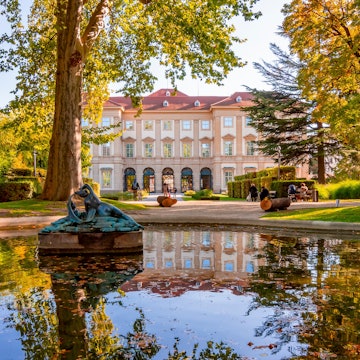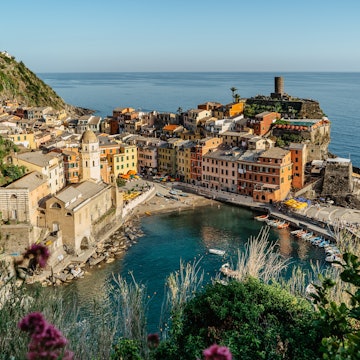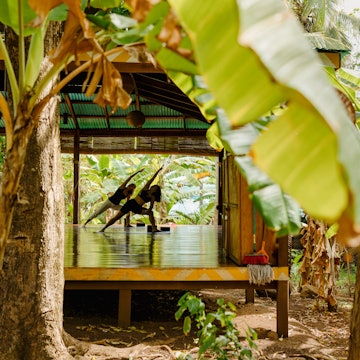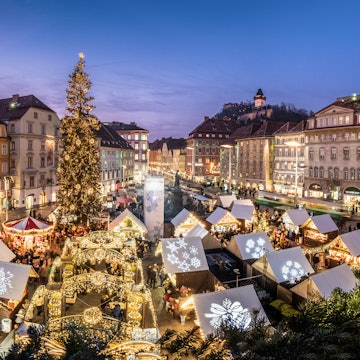
See the haunting beauty of the Czech Republic's industrial heartland

Sep 23, 2020 • 4 min read

Nature is slowly conquering some of the empty buildings of Lower Vítkovice © Angelo Zinna
Once one of the largest coal and iron production sites in Europe, Dolní Vítkovice is now a cultural heritage area representing one of the most impressive examples of 19th-century industrial architecture. After 162 years of operation, the Czech Republic’s “Iron Heart” has become a National Monument with furnaces, coke ovens, and brick buildings converted into museums and art spaces.

A 260-feet-high blast furnace dominates the brick and iron landscape of Lower Vítkovice, one of Ostrava’s outer districts, in the eastern tip of the Czech Republic. The tower once produced over a thousand tons of pig iron every day; now it transports small groups of visitors to the platform built on its top with a modern glass elevator, allowing people to admire the rusting remains that make up the immense carcass of this former industrial area.
Ostrava is a city like many others in Central Europe. A twin-towered cathedral stands tall among pastel-colored, asymmetrical facades in the old town’s center while a collection of almost identical concrete residential buildings from the socialist era stack up in the near suburbs. From Masarykovo náměstí, the city’s central square, a half-hour walk leads to the area on which the economy of this region has relied on for over a century, Dolní Vítkovice.

Located on the border between the historical regions of Moravia and Silesia, the Vítkovice industrial complex was founded in 1828 by order of the Olomouc Archbishop Archduke Rudolph Johann of Habsburg, who commissioned the construction of the first blast furnace for the puddling of pig iron due to the growing demand in the region. Ostrava was in an ideal position for the project: in addition to the Ostravice river that gave immediate access to water, an active coal mine supplying the fuel necessary to power the furnaces had already been established.

In September 1830 the new structure began to produce cast iron, but with the death of Archbishop Rudolf in 1831, institutions lost their enthusiasm for the metallurgical industry. The new Archbishop of Oloumuc was not very interested in the processes and opportunities of iron production, so he decided to cede control of the complex to the Austrian banker Salomon Mayer Rothschild. With the Rothschilds' investments, Vítkovice grew faster than ever, becoming the Austro-Hungarian’s navy only supplier of armor. With the turn of the century, Vítkovice had practically gained a monopoly over the production of cast iron within the borders of the Empire, making some of the highest profits in Europe.

During WWI, Vítkovice continued to expand through the production of armaments, but with the fall of the Austro-Hungarian Empire and the birth of Czechoslovakia, the industry transformed again to provide the materials for the construction of public infrastructure that would define the new Ostrava. Then the Nazis arrived. The units of the German Wehrmacht marched on Ostrava on March 14, 1939. Two years earlier, the Nazi threat had already prompted the Rothschilds to transfer ownership of the Vítkovice Ironworks to a London-based holding under their control in the hope of avoiding confiscation. It was an unsuccessful move: Louis Nathaniel de Rothschild was arrested by the Gestapo while trying to escape from Vienna and then was held hostage until the British holding company agreed to sell the ironworks to the German government. Vítkovice passed under the administration of the Reichswerke Hermann Göring in 1939.

The industry was nationalized after the war and remained active until 1998. With the closure, local institutions had to come up with a plan to figure out what to do with this massive pile of iron, brick, and concrete. Demolishing the industrial complex would have meant disposing of massive amounts of non-degradable materials, but on top of the potential threat to the environment, the destruction of Vítkovice’s ironworks would have caused the disappearance of a site that has left a mark on the history of Central Europe. The decision was made to preserve this unique example of nineteenth-century industrial architecture and keep it alive as a cultural icon of this corner of Europe. Since 2001 Dolní Vítkovice has been on the tentative list to become a Unesco World Heritage Site and since 2008 it has entered the European Cultural Heritage program as the first Czech site on the list.

Today Vitkovice is not an abandoned place, quite the opposite: besides the blast furnace that transports tourists to the elevated platform, renamed Bolt Tower (in honor of Jamaican athlete Usain Bolt, who has visited Ostrava on multiple occasions), Vitkovice offers cafes, museums, and art workshops that have repurposed the spaces once used for the production of cast iron. Access to the Vitkovice area is free, but it is possible to take a guided tour to access areas closed to independent visitors.
You might also like:
The most unique new architectural projects in the world
A grand tour of the world's most amazing architecture
8 stunning European cities for architecture lovers





















